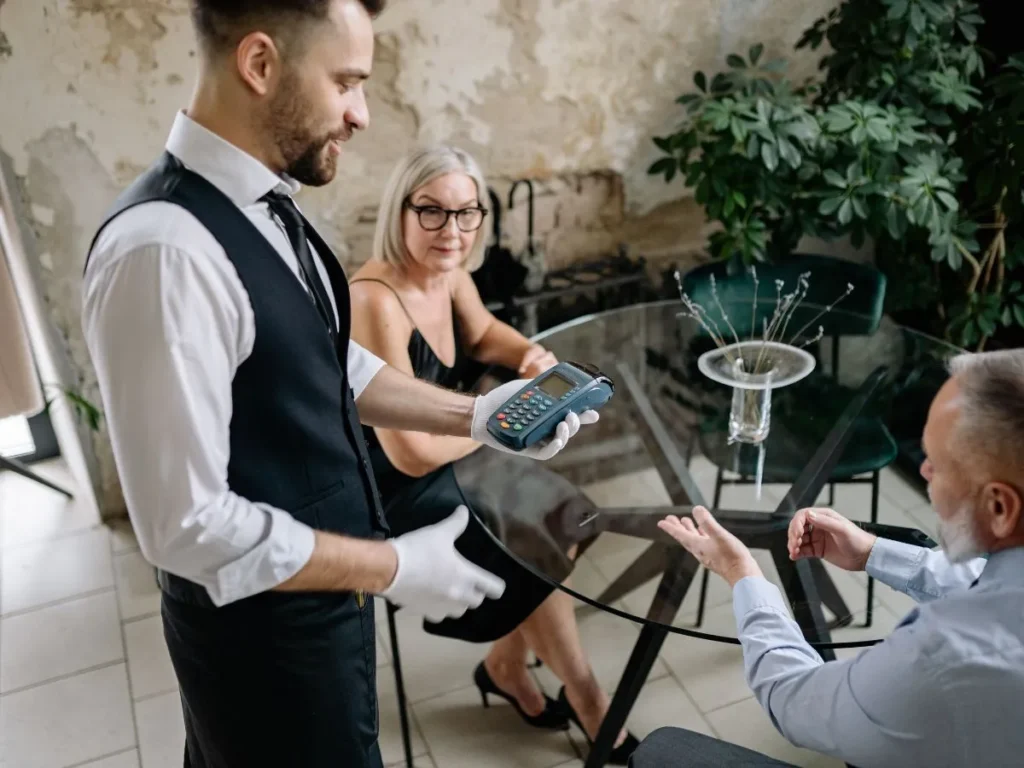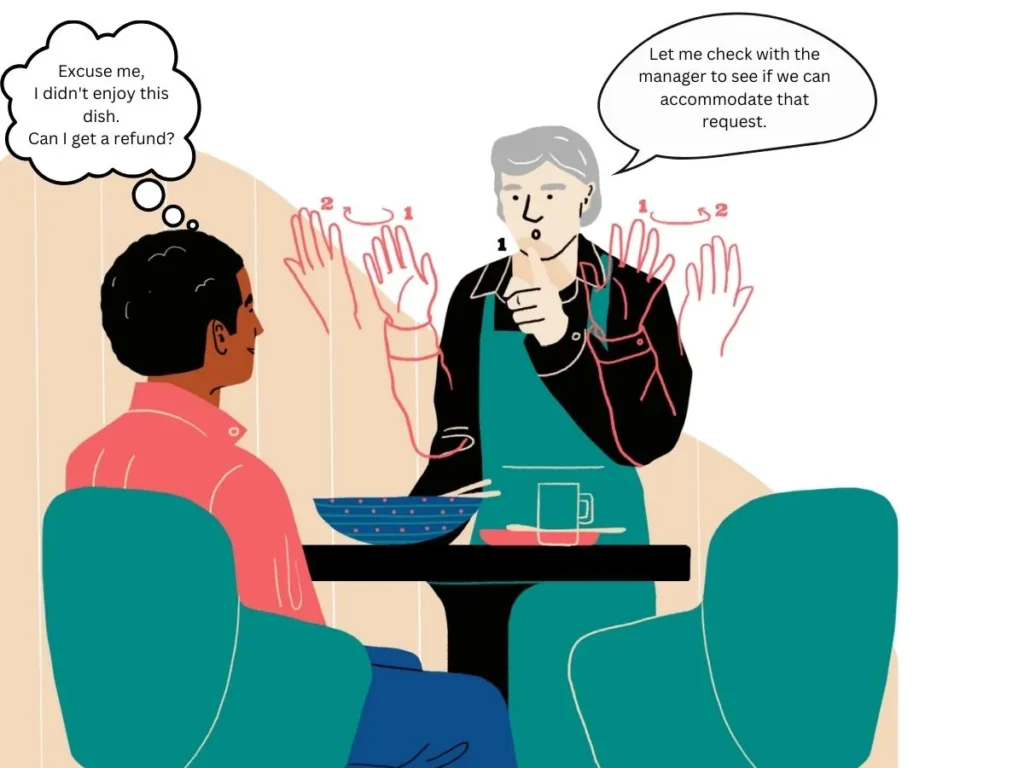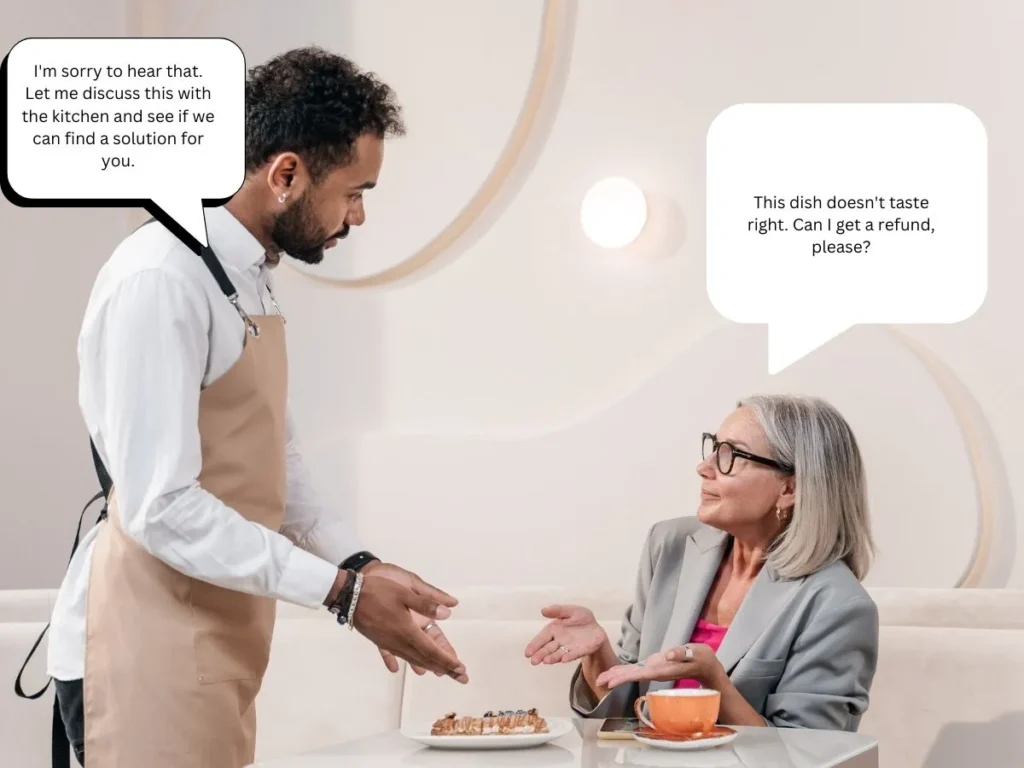Imagine the scene: you’ve eagerly anticipated a night out at a renowned restaurant, known for its delectable cuisine and inviting ambiance. As you step into the establishment, the tantalizing aroma of cooking delights your senses, setting the stage for a memorable dining experience. You settle into your seat, excitement coursing through you as you peruse the menu, envisioning the culinary journey ahead.
Yet, despite your anticipation, what if the reality fails to match your expectations? It’s a predicament many diners face: the sinking realization that the food simply doesn’t meet the mark. In such moments, a nagging question arises: Can I get a refund if I didn’t like the food? This query looms large, casting doubt on the balance between customer satisfaction and restaurant policies.
In the realm of dining etiquette, navigating the delicate balance between diner expectations and restaurant protocols is akin to walking a culinary tightrope. While patrons rightfully anticipate a satisfying dining experience, establishments must also contend with operational limitations and financial considerations. Understanding this delicate interplay is crucial in approaching dining encounters with tact and understanding. Can I Get A Refund If I Didn’t Like The Food? This question underscores the intricacies of the dining experience, prompting reflection on customer rights and establishment obligations alike.
Setting the Expectations: Know Before You Go
- Researching the Establishment: Before embarking on your culinary adventure, it’s essential to conduct thorough research on the establishment you plan to visit. Delve into online reviews, scour social media for recommendations, and peruse the menu to gain insight into the restaurant’s reputation and culinary offerings. Can I Get A Refund If I Didn’t Like The Food? By arming yourself with information, you can set realistic expectations for your dining experience and avoid potential disappointments
- Managing Expectations: It’s important to acknowledge that taste preferences are highly subjective and can vary widely among individuals. What one diner considers a culinary masterpiece, another may find unpalatable. Recognizing this variability is key to managing your expectations when dining out. Instead of expecting every dish to cater perfectly to your palate, approach each meal with an open mind and a willingness to explore new flavors and culinary experiences.
- Communicating Dietary Restrictions: Clear communication is paramount to ensuring a positive dining experience, especially when it comes to dietary restrictions or allergies. Take the initiative to inform your server of any special dietary requirements, whether it’s a gluten intolerance, a shellfish allergy, or a preference for vegetarian fare. By communicating your needs upfront, you empower the restaurant staff to accommodate your requirements and tailor your meal to your specifications.

Assessing the Situation: What Went Wrong?
Identifying the Issue
Can I Get A Refund If I Didn’t Like The Food? One of the first steps in addressing dissatisfaction with a meal is pinpointing the underlying issue. Was it a matter of taste, where the flavors failed to resonate with your palate? Or perhaps it was a question of quality, with ingredients falling short of expectations? Alternatively, was the dish prepared incorrectly, resulting in an unsatisfactory culinary experience? By identifying the root cause of the problem, you can better articulate your concerns and seek appropriate resolution.
Addressing Concerns
When faced with disappointment, it’s important to address your concerns with tact and diplomacy. Approach the restaurant staff politely and express your dissatisfaction in a constructive manner. Can I Get A Refund If I Didn’t Like The Food? By communicating your concerns respectfully, you open the door to dialogue and potential solutions. Whether it’s speaking to your server discreetly or requesting to speak with a manager, addressing concerns promptly can help prevent further dissatisfaction and pave the way for a positive outcome.
Providing Constructive Feedback
Can I Get A Refund If I Didn’t Like The Food? Providing constructive feedback is not only beneficial for addressing immediate concerns but also for fostering improvement in the long term. Offer suggestions for how the dish could be enhanced or adjusted to better meet your expectations. Whether it’s a tweak to the seasoning, a change in cooking technique, or a reevaluation of ingredient quality, your feedback can provide valuable insights for the restaurant’s culinary team. By framing your feedback in a constructive and collaborative manner, you contribute to a culture of continuous improvement and elevate the overall dining experience for yourself and future patrons.
Can I Get A Refund If I Didn’t Like The Food?
This poses a common concern among diners. Understanding restaurant policies, diplomatically advocating for a refund, and exploring alternative solutions are key. This query reflects the intricacies of navigating dining experiences and underscores the importance of knowing one’s options when dissatisfaction arises.
Navigating Refund Policies: Understanding Your Options
Examining Restaurant Policies
Before dining out, take the time to review the establishment’s refund and return policies. Familiarize yourself with the terms and conditions regarding refunds, especially in cases where dissatisfaction with the food arises. When assessing the restaurant’s policies, consider factors such as the circumstances under which refunds are offered and any requirements for documentation or proof of dissatisfaction. This proactive approach can help you navigate potential refund scenarios with confidence and clarity.
If you find yourself dissatisfied with a meal, it’s essential to know when and how to request a refund. When considering how to approach the issue with management, keep in mind the importance of diplomacy and professionalism. Express your concerns calmly and respectfully, providing specific feedback on what aspects of the meal were unsatisfactory. By communicating your dissatisfaction effectively, you increase the likelihood of a positive outcome and demonstrate your commitment to fair and reasonable resolution.
Exploring Alternatives
In situations where a refund may not be feasible or appropriate, explore alternative solutions with restaurant staff. Consider options such as discounts on future meals, complimentary desserts or drinks, or replacement dishes prepared to your specifications. When exploring alternatives, focus on finding mutually beneficial solutions that address your concerns while respecting the restaurant’s policies and limitations. By remaining open-minded and flexible, you can work towards resolving the issue in a constructive and amicable manner.

Dos and Don’ts
- Dos:
- Communicate politely: Express your dissatisfaction with the meal calmly and respectfully to the restaurant staff. By maintaining a courteous demeanor, you create a conducive environment for resolving the issue amicably.
- Provide feedback: Offer constructive feedback on what aspects of the meal were unsatisfactory to help the restaurant improve. Whether it’s the seasoning, presentation, or overall quality, providing specific feedback allows the restaurant to address any shortcomings and enhance the dining experience for future patrons.
- Refer to the refund policy: Familiarize yourself with the restaurant’s refund policy and reference it when discussing your concerns. Understanding the terms and conditions regarding refunds empowers you to advocate for your rights effectively and ensures that your requests are grounded in established guidelines.
- Don’ts:
- Be confrontational: Avoid being confrontational or aggressive when expressing your dissatisfaction, as this can escalate the situation and hinder the resolution process. Instead, maintain a calm and composed demeanor, focusing on finding a mutually satisfactory solution.
- Make unreasonable demands: Be realistic in your expectations and refrain from making unreasonable demands that may not align with the restaurant’s refund policy. While it’s natural to seek compensation for a subpar dining experience, it’s essential to temper your expectations and respect the limitations of the establishment.
- Assume entitlement: While you have the right to express your dissatisfaction, it’s essential to remember that refunds are typically offered at the discretion of the restaurant. Avoid adopting an entitled attitude and approach the situation with humility and understanding, recognizing that refunds are not guaranteed and may vary depending on the circumstances.
Handling Rejection: What If Refunds Aren’t Offered?
A. Respecting Restaurant Decisions: Understanding limitations and constraints.
In instances where refunds aren’t readily offered, it’s crucial to respect the decisions of the restaurant. Can I Get A Refund If I Didn’t Like The Food? Recognize that there may be limitations and constraints that prevent the establishment from providing refunds in certain situations. This could include factors such as financial considerations, operational constraints, or adherence to company policies. By understanding and respecting these limitations, you demonstrate empathy and understanding towards the restaurant’s position.
B. Seeking Resolution: Exploring compromise and finding common ground.
While refunds may not be forthcoming, there are still opportunities to seek resolution and find common ground with the restaurant. Can I Get A Refund If I Didn’t Like The Food? Engage in open and constructive dialogue with restaurant staff, exploring alternative solutions that address your concerns while respecting the establishment’s policies. This could involve discussing potential discounts on future meals, complimentary items, or other forms of compensation that align with both parties’ needs. By approaching the situation with a spirit of compromise and collaboration, you increase the likelihood of reaching a mutually satisfactory resolution.
C. Maintaining Composure: Handling disappointment with grace and dignity.
Regardless of the outcome, it’s essential to maintain composure and handle disappointment with grace and dignity. Can I Get A Refund If I Didn’t Like The Food? Avoid allowing frustration or disappointment to escalate into confrontation, as this can further strain the relationship with the restaurant and hinder the possibility of finding resolution. Instead, focus on maintaining a respectful and professional demeanor, acknowledging the efforts made by the restaurant to address your concerns and expressing gratitude for their attention to the matter. By handling the situation with maturity and composure, you contribute to a positive and constructive resolution process.

Learning from the Experience
Reflecting on the Experience:
- Opportunity for Growth: Every dining experience, regardless of its outcome, offers a chance for personal development and learning.
- Identification of Key Lessons: Reflecting on the situation enables diners to pinpoint essential lessons and insights gleaned from their dining experience.
- Recognition of Personal Preferences: Through reflection, individuals can become more aware of their unique tastes and preferences, helping them make more informed choices in the future.
- Understanding the Importance of Communication: One lesson often learned from dining experiences is the significance of clear and effective communication, both with restaurant staff and dining companions.
- Refining Expectations: Reflective analysis allows diners to refine their expectations for future dining endeavors, leading to more satisfying experiences overall.
- Fostering Self-Awareness: By taking the time to reflect on their dining experiences, individuals cultivate a deeper understanding of their own preferences, behaviors, and reactions in various culinary settings.
- Continuous Improvement: Through reflection, diners can identify areas for personal growth and improvement, ultimately enhancing their overall dining experiences and enjoyment.
Sharing Experiences: By sharing their dining experiences through reviews and feedback, individuals contribute valuable insights to the broader dining community. Honest and constructive feedback not only helps fellow diners make informed decisions but also provides restaurants with valuable input for enhancing their offerings and service. This exchange of information fosters a culture of transparency and accountability within the dining industry, ultimately benefiting both consumers and establishments alike.
Cultivating Positive Relationships:
- Expressing Gratitude: Taking the time to express gratitude for positive experiences at restaurants goes a long way in building positive relationships. Whether it’s a delicious meal, exceptional service, or a welcoming ambiance, acknowledging these aspects shows appreciation for the restaurant’s efforts.
- Offering Constructive Feedback: When providing feedback, focus on constructive criticism rather than complaints. Highlight areas where improvements can be made while also acknowledging the restaurant’s strengths. This approach fosters a sense of collaboration and mutual respect.
- Commitment to Constructive Dialogue: Engaging in open and honest dialogue with restaurant staff demonstrates a commitment to improving the overall dining experience. By addressing concerns and providing feedback in a constructive manner, diners contribute to a culture of continuous improvement.
- Encouraging Customer Satisfaction: Restaurants value feedback from their customers as it helps them understand their strengths and areas for growth. By offering constructive feedback, diners empower restaurants to prioritize customer satisfaction and make necessary adjustments to enhance the dining experience.
- Creating a Positive Environment: Fostering goodwill and constructive dialogue creates a positive environment for future interactions. When restaurants feel valued and respected, they are more likely to go above and beyond to ensure customer satisfaction, leading to a better overall dining experience for everyone involved.
Also Read: Where Should the Water Glass Be Placed on the Table?
Conclusion
Balancing customer expectations with business realities is essential for a harmonious dining experience. While diners have the right to expect quality food and service, it’s also crucial to understand the challenges and constraints faced by restaurants. By finding a balance between expectations and realities, both parties can work towards a mutually satisfactory outcome.
Effective communication plays a pivotal role in resolving issues and enhancing the dining experience. Whether expressing dissatisfaction with a meal or providing feedback for improvement, open dialogue fosters understanding and collaboration between diners and restaurants. Can I Get A Refund If I Didn’t Like The Food? By communicating openly and respectfully, diners can navigate potential challenges with confidence and clarity.
As diners, it’s important to approach dining experiences with an open mind and a spirit of understanding. While disappointments may arise, it’s essential to view them as opportunities for growth and learning. Can I Get A Refund If I Didn’t Like The Food? By reflecting on experiences, offering constructive feedback, and fostering positive relationships with restaurants, diners can contribute to a culture of continuous improvement and ultimately enhance the overall dining experience for themselves and others.
FAQ’s
What are some common reasons for food refunds?
Some typical causes for food refunds include getting wrong orders, discovering extraneous items in the meal, or having food poisoning symptoms.
Can I get a refund if I didn’t like the food?
Yes, you may usually seek a refund if you didn’t like the food; however, regulations may differ based on the restaurant or organization.
Under what circumstances must retailers accept returns?
Retailers must normally allow returns if the goods are faulty, damaged, or do not correspond to the description supplied at the time of purchase.
What if the food doesn’t match the advertisement?
If the meal does not match the advertisement, you may be eligible for a refund or exchange, particularly if the difference significantly impacts the product’s quality or value.
